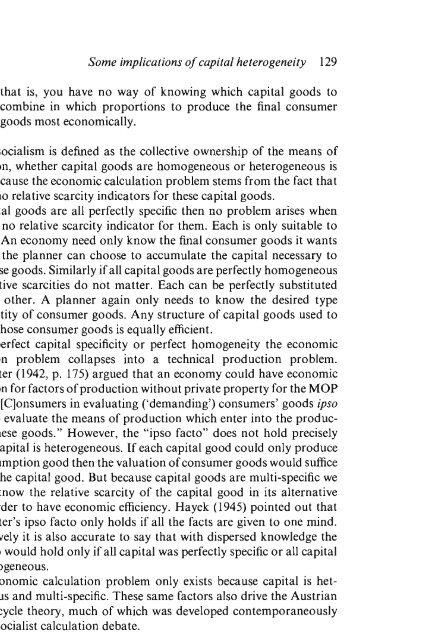Handbook on Contemporary Austrian Economics
Handbook on Contemporary Austrian Economics
Handbook on Contemporary Austrian Economics
You also want an ePaper? Increase the reach of your titles
YUMPU automatically turns print PDFs into web optimized ePapers that Google loves.
Some implicati<strong>on</strong>s of capital heterogeneity 129<br />
- that is, you have no way of knowing which capital goods to<br />
combine in which proporti<strong>on</strong>s to produce the final c<strong>on</strong>sumer<br />
goods most ec<strong>on</strong>omically.<br />
Because socialism is defined as the collective ownership of the means of<br />
producti<strong>on</strong>, whether capital goods are homogeneous or heterogeneous is<br />
crucial because the ec<strong>on</strong>omic calculati<strong>on</strong> problem stems from the fact that<br />
we have no relative scarcity indicators for these capital goods.<br />
If capital goods are all perfectly specific then no problem arises when<br />
you have no relative scarcity indicator for them. Each is <strong>on</strong>ly suitable to<br />
<strong>on</strong>e task. An ec<strong>on</strong>omy need <strong>on</strong>ly know the final c<strong>on</strong>sumer goods it wants<br />
and then the planner can choose to accumulate the capital necessary to<br />
make those goods. Similarly if all capital goods are perfectly homogeneous<br />
their relative scarcities do not matter. Each can be perfectly substituted<br />
for every other. A planner again <strong>on</strong>ly needs to know the desired type<br />
and quantity of c<strong>on</strong>sumer goods. Any structure of capital goods used to<br />
produce those c<strong>on</strong>sumer goods is equally efficient.<br />
With perfect capital specificity or perfect homogeneity the ec<strong>on</strong>omic<br />
calculati<strong>on</strong> problem collapses into a technical producti<strong>on</strong> problem.<br />
Schumpeter (1942, p. 175) argued that an ec<strong>on</strong>omy could have ec<strong>on</strong>omic<br />
calculati<strong>on</strong> for factors of producti<strong>on</strong> without private property for the MOP<br />
because "[C]<strong>on</strong>sumers in evaluating {'demanding') c<strong>on</strong>sumers' goods ipso<br />
facto also evaluate the means of producti<strong>on</strong> which enter into the producti<strong>on</strong><br />
of these goods." However, the "ipso facto" does not hold precisely<br />
because capital is heterogeneous. If each capital good could <strong>on</strong>ly produce<br />
<strong>on</strong>e c<strong>on</strong>sumpti<strong>on</strong> good then the valuati<strong>on</strong> of c<strong>on</strong>sumer goods would suffice<br />
to value the capital good. But because capital goods are multi-specific we<br />
need to know the relative scarcity of the capital good in its alternative<br />
uses in order to have ec<strong>on</strong>omic efficiency. Hayek (1945) pointed out that<br />
Schumpeter's ipso facto <strong>on</strong>ly holds if all the facts are given to <strong>on</strong>e mind.<br />
Alternatively it is also accurate to say that with dispersed knowledge the<br />
ipso facto would hold <strong>on</strong>ly if all capital was perfectly specific or all capital<br />
was homogeneous.<br />
The ec<strong>on</strong>omic calculati<strong>on</strong> problem <strong>on</strong>ly exists because capital is heterogeneous<br />
and multi-specific. These same factors also drive the <strong>Austrian</strong><br />
business cycle theory, much of which was developed c<strong>on</strong>temporaneously<br />
with the socialist calculati<strong>on</strong> debate.<br />
9.4 Business cycles<br />
Its capital theory is a distinguishing characteristic of <strong>Austrian</strong> business<br />
cycle theory (ABeT). Most macroec<strong>on</strong>omic schools of thought model<br />
capital (or investment) as homogeneous. Thus, when examining business

















